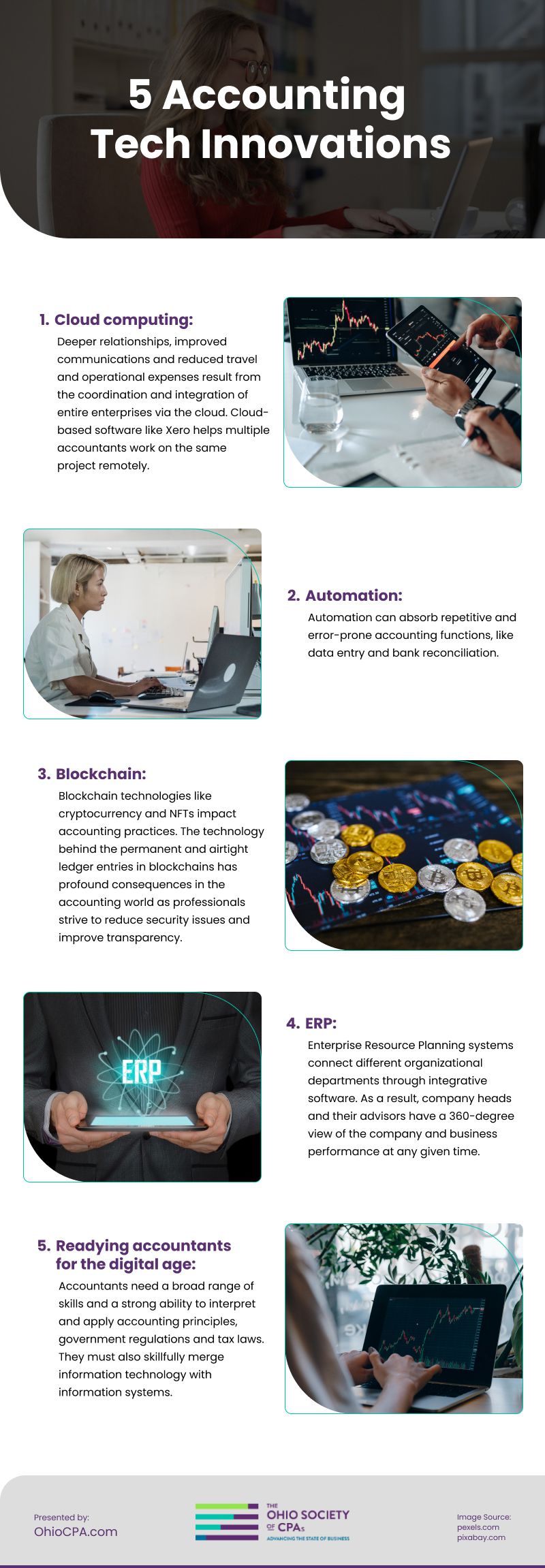
(Mikhail Nilov / pexels)
Science and technology have made accounting simultaneously effortless and more complex. For example, machines can now handle a variety of accounting-related calculations with extreme accuracy, practically eliminating human error. However, fractions of cents in a cryptocurrency wallet can complicate calculations and transactions.
Technology and accounting through the ages
From symbols, tally marks and the abacus to adding machines, calculators and cloud computing, technology has advanced accounting functions over centuries. During the Industrial Revolution, accountants had to adjust their practices to maintain stakeholder knowledge and ensure the sustainability and trustworthiness of financial systems. Not long ago, important paperwork filled dedicated file storage rooms. Today, electronic spreadsheets have rendered manual, paper-based ledger books obsolete.
Accounting advantages
The introduction of technology and computers made accounting tasks more efficient and less time-consuming. We now analyze, forecast and run statistics with unprecedented interconnectivity and record timing.
The game is changing from documenting and calculating to advising and consulting with data-driven insights to back up proposals. Accountants with technical, computer and analytical know-how will become indispensable to business executives looking for guidance in all company sectors, such as supply chain management and IT.
The beginning of accountancy transformed into our modern-day accounting replete with digital tools and trends. Some notable technologies assisting accountants today include:
Cloud computing
Companies rely on off-site servers to bear the brunt of processing business applications and storing data. They no longer have to invest in the bandwidth or space it takes to run software or save large volumes of data.
Deeper relationships, improved communications and reduced travel and operational expenses result from the coordination and integration of entire enterprises via the cloud. Accountants and clients can securely upload and access pertinent information from their mobile phones or laptops on a digital network, virtually sharing materials around the clock and across the miles. Cloud-based software like Xero helps multiple accountants work on the same project remotely.
Businesses have reduced their realty, file-keeping and IT expenses while increasing efficiency and adding value to client relationships. In addition, small businesses now have global access to clients and talent just like their larger counterparts.
Automation
Automated technologies have transformed the daily operations of accountants. Recording and reconciling can be done by machine with greater ease and accuracy, freeing accountants to delve deeper into the numbers in analytical and forecasting capacities.
Automation can absorb repetitive and error-prone accounting functions, like data entry and bank reconciliation. Accountants must be ready and willing to find and adopt new technology to assist with time-consuming tasks. Even simple Excel macros can help speed up accounting processes.
Blockchain
No blockchain technologies can help accounting tasks yet, but blockchain technologies like cryptocurrency and NFTs impact accounting practices. The technology behind the permanent and airtight ledger entries in blockchains has profound consequences in the accounting world as professionals strive to reduce security issues and improve transparency.
Additionally, blockchain technology helps establish trust between business entities, minus the middleman of banks. Cryptocurrencies and NFTs add both complexity and security to transactions – while blockchains add security, the uncertainty and newness of it have the opposite effect. Accountants must be able to comprehend, quantify and report on blockchain and cryptocurrency transactions, which is why continuing education courses for accountants are so vital.
ERP
Enterprise Resource Planning systems connect different organizational departments through integrative software. As a result, company heads and their advisors have a 360-degree view of the company and business performance at any given time (and in real-time) for deeper insights and comprehensive decision-making.
Readying accountants for the digital age
Technology influences accounting and vice versa. Technology increasingly assists accountants with repetitive tasks, enabling a rise to new realms and greater ambitions. And recent accounting trends, such as fractions of cents in cryptocurrency, will give rise to new technology to help us understand and compute data.
The future of accounting looks brighter and more lucrative than ever as CPAs and financial professionals become the trusted right-hand advisors to the C-suite. The profession is entering an environment of fast-paced changes and tech-driven decisions. As a result, we must vigilantly prepare for transformations resulting in high-impact and high-value roles.
Accountants need a broad range of skills and a strong ability to interpret and apply accounting principles, government regulations and tax laws. They must also skillfully merge information technology with information systems. Adopting and optimizing new software to remain relevant and competitive in global markets is critical. Additionally, since accounting is becoming less about number-crunching and more about interpreting and relaying data, accountants need stellar management and communication skills.
The best way to prepare ourselves for the future is to stay up-to-date with technological advances and embrace what’s new. How do we do that efficiently (our profession is all about efficient use of resources, after all)? We invest in ourselves by partnering with and participating in accounting membership organizations that help us meet our CPE learning objectives and keep our skills relevant.
Infographic
The introduction of technology and computers made accounting tasks more efficient and less time-consuming. We now analyze, forecast, and run statistics with unprecedented interconnectivity and record timing. The field of accountancy has evolved into modern-day accounting, which heavily relies on digital tools and trends. Keep reading and discover the five accounting tech innovations in this infographic.

Video